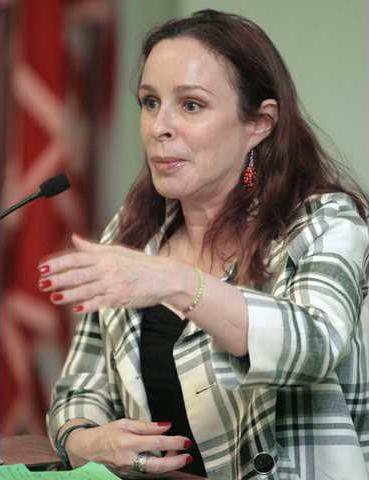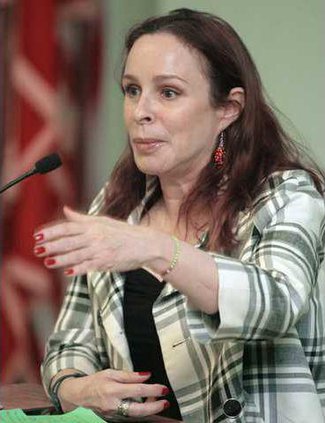Alina Fernandez, daughter of Cuban leader Fidel Castro, shared personal stories of her life in Cuba on Tuesday, including her escape nearly 20 years ago and memories of the father she said she wouldn’t care to meet again.
Fernandez, who lives in Miami with her daughter, spoke to a packed auditorium at Gainesville State College, recalling the day when images of the executions ordered by Castro during the Cuban Revolution replaced her morning cartoons on TV.
“Shouts of ‘Viva Cuba libre!’, which means long live free Cuba, thundered through the living room,” she said. It was the beginning of the revolution, a violent conflict led by Castro that resulted in the downfall of the U.S.-backed government and the beginning of five decades of rule by Castro.
Castro had an affair with Natalia Revuelta, Fernadez’s mother, while married to another woman before the revolution took off, Fernandez said. Revuelta became an integral part of the revolution, even collecting money to buy weapons and uniforms for soldiers. When Castro was imprisoned, he and Reveulta corresponded through letters.
“I think their love began that way,” Fernandez said. “Fidel wrote to my mother a lot, I can tell you. But he also wrote to his wife.”
The affair was discovered when a prison guard “mixed up” letters from Castro to the women, and his marriage eventually ended, Fernandez said.
Although Fernadez is Castro’s biological daughter, she is considered an illegitimate heir. Throughout her tumultuous adolescence, she said she tried to break away from the politics of her family.
“I think I wasted a big part of my early years trying to escape his control, but I never succeeded,” she said.
In 1989, she publicly joined a group of political dissidents and said she often feared Castro’s wrath.
“For me, life went from white to black and stayed gray for a long, long time,” she said. When her stepfather Orlando Fernandez was exiled as a traitor, Fernandez left her home with her mother.
“You could see Cuban people exchanging their laughter for destructive frenzy,” she said. Stores were closed and many foods were unavailable, such as ice cream and fresh fruits. Citizens were handed ration booklets for food, and executions were broadcast on national airwaves.
“Little by little, any good thing, any good habit vanished from my life,” she said.
Fernandez recalled the night she was introduced to her father, whom she knew up to that point only as the “night visitor.” Sitting in a cloud of cigar smoke, Castro handed her a doll dressed in a uniform matching his own.
“I tried to pull the hair out,” she said with a laugh. “Looking back then, I can say since the very moment the executions took place, fear embraced the population and the country and stayed forever.”
Not much has changed in 50 years, Fernandez said, despite Castro’s resignation from the presidency in 2008 due to failing health. Castro’s government installed his brother, Raúl, in his place, and Castro took on a new title as first secretary of the Communist Party.
It was not until December 1993 that Fernandez decided to flee the country where it was becoming impossible to mask her political beliefs. Disguised as a Spanish tourist, she left with the aid of friends, taking her teenage daughter with her.
In Miami, Fernandez hosts a radio talk show and has maintained a rocky relationship with her mother, who still lives in Cuba and supports Castro.
For first-year student Cecilia Guerrero, 22, Fernandez’s speech helped her put a face to the political conflict. Guerrero snapped pictures of friends standing with Fernandez along with dozens of other students following the lecture.
“I think (her story) is very sad,” she said. “But it’s important because we only know the political part of it. We don’t know anything about Fidel Castro’s family.”
When asked by an audience member whether she had any desire to see her father again, Fernandez’s response was brief.
“No.”


